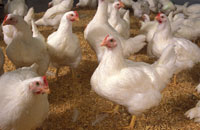



ARS Researchers Breed Less Aggressive Hens
US - Agricultural Research Service (ARS) scientists are helping to breed gentler laying hens that still produce eggs to industry standards and do not require beak-trimming.A team of scientists led by Agricultural Research Service (ARS) biologist Heng-wei Cheng at the agency's Livestock Behavior Research Unit in West Lafayette, Indiana, and William M. Muir of Purdue University, also at West Lafayette, has developed a line of laying hens that display far less aggression than their commercial counterparts, while maintaining industry standard egg production. As a result of this development, the researchers were able to cut mortality losses among the birds without the usual beak-trimming.

At 58 weeks of age, the selected line of hens had significantly lower annual mortality than the control group, which comprised layers from a commercial line. When housed in communal cages, the kinder, gentler line had a 20 per cent mortality rate, compared to 54 per cent for the control line and 89 per cent for the commercial line. Egg production was increased in the gentler birds, compared to the control line and the commercial line under the same conditions.
Most breeding programmes in the past 50 years have concentrated only on traits related to production. For instance, through more than 20 years of breeding selection, egg production has increased significantly in one commercial line of laying hens, while mortality due to aggression and cannibalism among the birds with untrimmed beaks has also increased about 10-fold.
Dr Cheng and his colleagues selected breeding birds based not just on production traits but also took into account competitive interactions among the birds in a group, or communal, setting. This selection programme turns 'survival of the fittest' (which emphasises the individual) into 'survival of the adequate' (which emphasises the group).
Dr Cheng is conducting further research to look at physiological alterations that explain the less aggressive behavior in the new line of hens. His preliminary work indicates this may be due to a decrease in dopamine levels in the birds. Dopamine is a neurotransmitter that has been associated with dysfunctional behavior, as well as with a decline in the ability to cope with stress.









